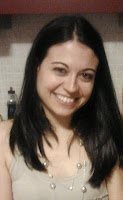 Mi chiamo Ilaria, ho (quasi) 30 anni e sono nata e cresciuta a Firenze. Nella mia
bellissima città ho completato gli studi – prima il liceo linguistico, poi
l’Università – il cui filo conduttore è sempre lo stesso: le lingue straniere.
Studiarle mi piace tantissimo e le imparo con poca difficoltà, quindi scegliere
questo percorso è stato piuttosto facile. Da sempre amo i Paesi dell’Europa del
nord e durante i miei studi ho deciso di imparare il finnico: ho fatto anche
una bellissima esperienza in Finlandia, dove ho frequentato un corso estivo di
lingua e cultura finlandese.
Mi chiamo Ilaria, ho (quasi) 30 anni e sono nata e cresciuta a Firenze. Nella mia
bellissima città ho completato gli studi – prima il liceo linguistico, poi
l’Università – il cui filo conduttore è sempre lo stesso: le lingue straniere.
Studiarle mi piace tantissimo e le imparo con poca difficoltà, quindi scegliere
questo percorso è stato piuttosto facile. Da sempre amo i Paesi dell’Europa del
nord e durante i miei studi ho deciso di imparare il finnico: ho fatto anche
una bellissima esperienza in Finlandia, dove ho frequentato un corso estivo di
lingua e cultura finlandese.
Le cose che mi
piace fare sono veramente tante… Prima di tutto, fin da bambina ho praticato la
ginnastica artistica, con il desiderio di diventare un giorno un’istruttrice:
sogno che ho realizzato da parecchi anni, insegnando in una palestra a bambine
e ragazze dai 5 ai 13 anni. Amo tantissimo viaggiare: sono una di quelle che
quando va all’estero cerca di assaggiare i piatti tipici e di parlare la lingua
del posto (e se non so la lingua del posto, mi procuro un frasario e tento di
usarlo!). Tra i luoghi che amo di più visitare c’è sicuramente la montagna, in
particolare le Dolomiti, che frequento (quando è possibile…) sia d’estate
facendo trekking, che d’inverno con gli sci ai piedi. Penserete quindi che sia
una persona piuttosto sportiva, ma non è del tutto così: come quasi tutte le
donne amo anche lo shopping e la moda, e da qualche anno vesto anche i panni
della nobildonna rinascimentale fiorentina. Faccio infatti parte di un gruppo
di rievocazioni storiche con il quale partecipo a cortei e pratico la danza
rinascimentale, in Toscana ma anche nel resto d’Italia e all’estero. Non è
ancora tutto: un’altra delle mie passioni è la cucina e non vedo l’ora che i
miei amici organizzino qualche cena per cimentarmi in nuove ricette –
prevalentemente dolci, ma anche salati!
Attualmente
collaboro con l’Istituto Europeo a Firenze, dove svolgo attività di segreteria
ed orientamento degli studenti stranieri. Sono veramente felice di aver avuto
questa opportunità, perché mi piace molto lavorare a contatto con gli stranieri
e trovo che oltretutto sia anche una grande responsabilità: cercare di
trasmettere loro l’amore per l’Italia, la sua storia, la sua cultura e la sua
lingua.




_3.jpg)